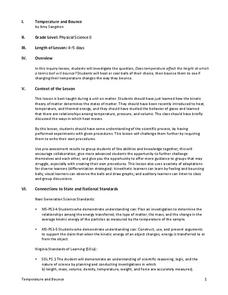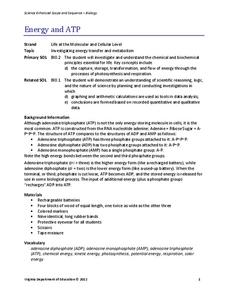Columbus City Schools
Transformation: Energy in Disguise
Energy transformations happen everywhere, every second of the day. The energy transformation common to most scholars is potential and kinetic energy. The three-week lesson covers multiple types of energy transformations through...
National Wildlife Federation
An Energy Mix: Renewable and Nonrenewable Resources
What did the windmill say about renewable energy? I'm a BIG fan! Lesson three in the series of 12 has classes discuss potential and kinetic energy and then, in pairs, they complete a web quest over the different types of energy...
Teach Engineering
Amusement Park Ride: The Ups and Downs in Design
Groups design the ultimate roller coaster by considering potential and kinetic energy. They test their designs using marbles and then go on to rate each group's design based on aesthetics, loop diameter, and cost.
Tech Museum of Innovation
Energy at Play
Get the ball rolling and challenge your class to figure out how to make a ball move. The instruction segment is between two STEM activities devoted to doing just that. The first is simple and involves making a ball move from some force...
PHET
Atomic Interactions
Who knew atoms could be attracted to each other? A simulation allows learners to see how forces between atoms influence the attraction between them. Classes see the attractive and repulsive forces adjusting as distance between atoms...
Rochester Institute of Technology
Skateboard Performance Testing
Perform an activity on performance testing with a lesson focused on the purpose of wheel bearings on skateboards. Learners conduct performance testing on a skateboard to collect and interpret data.
National Energy Education Development Project
The Science of Energy
Did you know the word energy comes from energeia, a Greek word? Introduce learners to the four types of potential energy, five types of kinetic energy, and energy transformation with a presentation about where we get our energy and how...
Teach Engineering
Energy and the Pogo Stick
Let your class bounce to examine the concept elastic potential energy. Individuals bounce on a pogo stick in order to calculate its elastic potential energy. Groups then compare the elastic potential energy to the gravitational potential...
Teach Engineering
Pushing it Off a Cliff
Focus on the conservation of energy, specifically looking at gravitational potential energy and kinetic energy, with a lecture that involves having friends throw light objects at each other to determine which has more kinetic energy and...
Urbana School District
Electric Fields
What kind of pears do electricians eat? Amperes! Presentation begins with electric field vectors for various charge configurations and field strengths for both point charges and uniform fields. It continues with various surfaces,...
Science Geek
Basic Thermochemistry
Heat is more than just temperature, as viewers discover throughout a presentation about thermochemistry that emphasizes vocabulary. Definitions include joule, calorie, energy, enthalpy, calorimetry, exothermic and endothermic process,...
Teach Engineering
Energy Storage Derby and Proposal
Small groups use the engineering design process to build and test a vehicle capable of carrying 250 grams a distance of five meters. The design must allow for the storage of potential energy and turn it into motion, allowing the...
Teach Engineering
It's Tiggerific!
Spring into elastic potential energy with a activity that provides background information on determining the elastic potential energy of springs and other elastic materials. General energy equations emphasize the conservation of energy...
Teach Engineering
Energy Skate Park
Skate through a simulation on energy with an a activity that uses a computer simulation of a skater to reinforce the concept of conservation of energy. The resource guides pupils through scenarios using the computer simulation to see the...
Teach Engineering
Energy on a Roller Coaster
Roll with your class into the idea of conservation of energy. Pupils use a roller coaster track to collect data to reinforce the concept of conservation of energy and the influence of friction. Class members then create a graph from...
Teach Engineering
Ramp and Review (for High School)
Rolling for momentum. As part of a study of mechanical energy, momentum, and friction, class members experiment rolling a ball down an incline and having it collide with a cup. Groups take multiple measurements and perform several...
It's About Time
States of Matter: Solid, Liquid, and Gas
Solid, liquid, and gas: they all matter. Scholars create an animation of the various states of matter, experiment with the temperature of water as it changes states, and observe carbon dioxide as it changes states. The lesson also...
Teach Engineering
Swinging Pendulum
Get into the swing of things. Pupils use a pendulum to demonstrate the conversion of potential energy to kinetic energy and back. After measuring the speed of a pendulum and compare it to the calculated theoretical speed, they determine...
Teach Engineering
Bouncing Balls
How high will it bounce? Groups determine the height different balls bounce off of different surfaces. By performing the necessary calculations, they determine the initial and final momentum of the balls. The included worksheet provides...
STEM for Teachers
Temperature and Bounce
Take part in a fun experiment and hold an impromptu bouncing contest with your class. Young scientists heat and cool balls before bouncing them to determine whether temperature changes affect how they bounce. The set of STEM lesson plans...
It's About Time
Exploring Energy Resource Concepts
Please turn off the lights to conserve energy. Or not, after all energy is always conserved. This first lesson in an eight-part series includes three parts. Part A contains one hands-on activity and two inquiry-based experiments on heat...
Virginia Department of Education
Energy and ATP
Take charge of your biology class by using this exciting analogy to relate the ATP process with batteries. Pupils use batteries and rubber bands to simulate the phosphate bonds between molecules in the body. They measure the distance in...
Virginia Department of Education
States and Forms of Energy
Energy is just energy, right? Explain various forms of energy to your young scientists by using an interactive experiment that contains common objects to demonstrate complex concepts. Pupils conduct experiments for radiant, thermal,...
Teach Engineering
Energy Forms and States Demonstrations
Does a tennis ball have energy? What about a bowling ball? Demonstrate concepts of different forms of energy forms and states with a variety of objects. Using the equations for potential and kinetic energy, learners determine the amount...

























